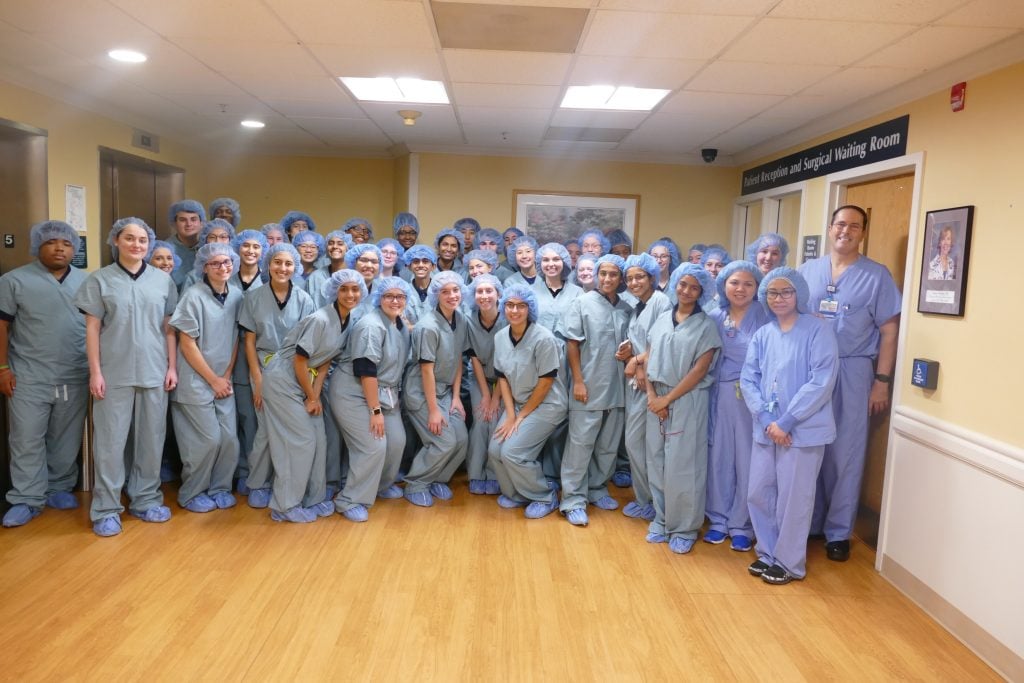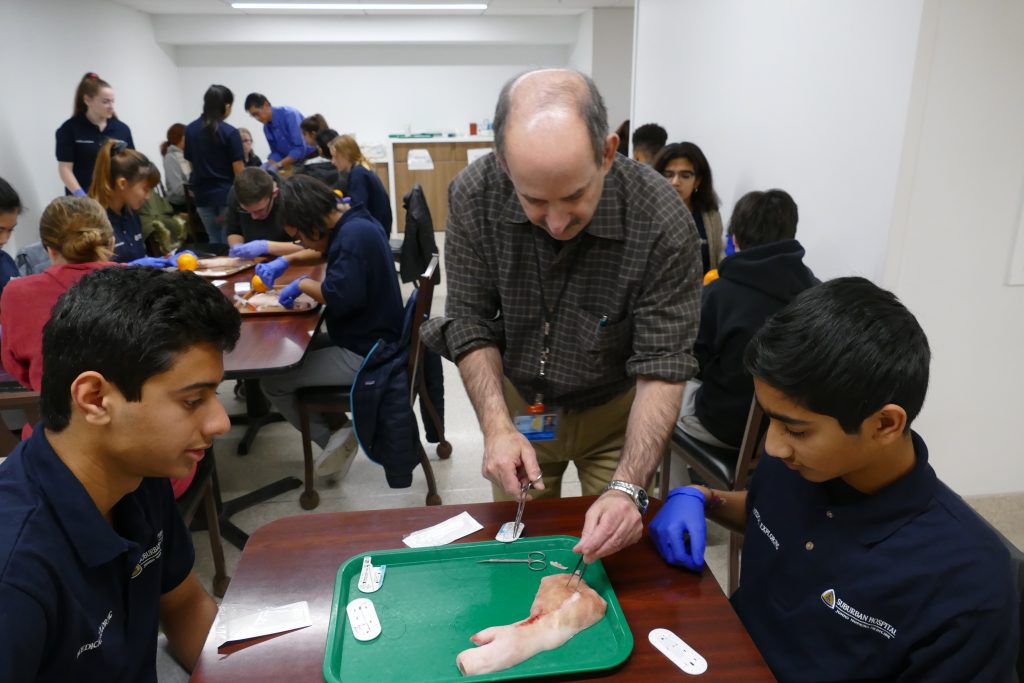To overcome the potential looming dearth in the next generation of endocrinologists, Suburban Hospital in Bethesda, Md., is using a unique interactive method to inspire and engage young minds. The Medical Exploring Program gives high school students hands-on experiences over the course of a school year that could feasibly create the clinicians — and clinician scientists — of tomorrow.
Suturing pigs’ feet is always a big hit. But for the high schoolers enrolled in the Medical Exploring program at Suburban Hospital, getting past the initial “gross out” comes first.
“I personally find it very helpful to combine this type of experience with some type of hands-on practicum, so we purchase pigs’ feet from the local supermarket and teach students how to do some simple suturing,” says Leo C. Rotello, MD, director of Clinical Care at Suburban Hospital located in Bethesda, Md. “It always goes over very well, and both the students and teachers have a lot of fun with it.”

Medical Exploring is a yearlong, interactive educational program offered at Suburban Hospital, a community hospital, to high school students interested in healthcare, medicine, or research.
“We try to give students an idea of different opportunities that are available to them if they are interested in pursuing a career in the medical sciences,” explains Rotello, who has volunteered to lead a Medical Exploring session such as the suturing lab session for more than 10 years. “The range is very broad and can include physicians, nurses, physician assistants, nurse practitioners, nurse anesthetists, and more. We try to give students a realistic idea of what it takes to be successful and what a typical day in the life of each of these professions might look like.”
The Medical Exploring program began in partnership with The Boy Scouts of America nearly 30 years ago at Suburban, which is a member of Johns Hopkins Medicine. The Boy Scouts is headquartered not too far from the hospital.
“Given that Medical Exploring was already a part of the Boy Scouts of America curriculum when they were looking for a healthcare partner to expose youth to the fields of medicine and science, it was a natural fit that two like-minded partners come together” says MoniqueSanfuentes, administrative director of Community Affairs and Population Health.
Rotello says he experienced similar exposure to medicine during his years as a former Boy Scout. “Some of those experiences were very powerful in helping me formulate a career plan for myself,” he says. “I hope to provide a similar venue for the young adults in the Medical Exploring program as they look to develop the next steps in life.”
Medical Exploring is open to all high school students regardless of their grade point average. Cost for the program is just $35 and financial assistance is available for students in need. The program’s ground rules are simple — students are expected to attend 80% of the sessions and must personally RSVP in advance for each session they plan to attend.
“I believe we need to build a positive relationship that has the potential to change the course of a teen’s professional path. Perhaps, a few of them would even become endocrinologists and help to take care of our community.”
Mihail Zilbermint, MD, chief of Endocrinology, Diabetes, and Metabolism, Suburban Hospital, Bethesda, Md.
Due to ongoing COVID-19 restrictions for in-person activities in hospital settings, Medical Exploring sessions are now held remotely on Zoom two or three evenings a month from October through May.
Prior to the pandemic, the program integrated at least two field trips and past trips have included tours to the Walter Reed Medical Museum, Consumer Product Safety Commission, and the National Library of Medicine at the National Institutes of Health.
Ninety-six students are enrolled in this year’s program. “Switching to a remote format has proven to be successful as it has allowed for more students to join us,” says Kate McGrail, program manager, Population Health Integration at Suburban Hospital. “The remote access eliminates the need for many students to travel to the hospital by bus in the evening.
“The virtual format also has allowed us to partner with our Johns Hopkins Health System partner, All Children’s Hospital in St. Petersburg, Fla.,” McGrail adds. “Suburban Hospital doesn’t have an obstetrics department, but we can partner with All Children’s who has a similar medical exploring program, and we trade sessions. They will participate in our cardiothoracic session, and we will join in their pediatrics.”

Seventeen sessions, each led by a healthcare provider at Suburban, are planned for the 2022-23 school year and the vast list of lecture topics include, Medicine for the Greater Good, Emergency Medicine & Trauma Care, Leadership in Healthcare, Anatomic Pathology, and Clinical Collaboration & Teamwork.
McGrail says recruiting providers to lead the sessions is an ongoing effort but it’s never difficult to find volunteers. “Every time that we meet a new provider, we’re always thinking where we can plug them in for the best fit?” she says. “We constantly keep a rolodex of engaged staff and we rotate them in. I already know who I’m going to invite for next year.”
Mihail Zilbermint, MD, is chief of Endocrinology, Diabetes, and Metabolism at Suburban Hospital, and has led the session on “Endocrine, Diabetes, and Metabolism Services” for the past three years. “I usually teach them about diabetes, insulin, and continuous glucose monitors,” Zilbermint says. “I’ve also partnered with a patient who was able to demonstrate how to check glucose and inject insulin using an insulin pen. These high school students are fascinated with modern diabetes technology ‘toys.’”
Zilbermint fondly recalls participating in a similar program during his high school years in his native home of Chisinau, Moldova, where the highlight was a visit to the surgical theatre of Republican Clinical Hospital to watch physicians conduct a real surgical procedure — a stomach resection.
“I am sure that experience solidified my decision to go to medical school to become a surgeon,” he says. “Our classes were taught by a fantastic nurse practitioner and this Medical Exploring program is my opportunity to give back.”
Acomprehensive outreach process is in place to spread awareness of the program to area high schools, which includes reaching out to counselors and principals of both private and public schools and including information in Suburban Hospital’s monthly electronic newsletter.
“We’ve seen a lot of our fellow employees enroll their children in the program,” Sanfuentes says. “So, internally, as our colleagues’ children get to high school, they are looking forward to this. Every year, we get a lot of feedback from our colleagues, which I consider the most critical and powerful feedback as medical professionals who really inspire their children.”
Many Medical Explorers enjoy the program so much that they return for a second or third year, says Sanfuentes. “We are cognizant that many students want to return so every year we try to change the program a little bit with different speakers,” Sanfuentes adds. “There’s always something new to learn and we can’t cover it all in one year.”
“We typically have returning students who sign themselves up without their parents,” Sanfuentes continues. “We are getting very motivated high school students who really find something very valuable in the material and see the value of having an opportunity for one-on-one question and answer sessions.”
“We try to give students an idea of different opportunities that are available to them if they are interested in pursuing a career in the medical sciences. We try to give students a realistic idea of what it takes to be successful and what a typical day in the life of each of these professions might look like.”
Leo C. Rotello, MD, director, Clinical Care, Suburban Hospital, Bethesda, Md
Explorers who attend for a second year and achieved 80% attendance the previous year are encouraged to apply to become a student officer, an opportunity that allows for additional leadership roles that offer more preparation for the healthcare workforce.
“Once Suburban Hospital sets up the speakers, our student officers run the show from there on out,” McGrail explains. “This is their opportunity to lead, so they are staying on top of the schedule. They also invite the students to go through the RSVP process, they write the bios for each speaker, they’re writing follow-up thank you notes, and they’re facilitating during the session. It’s an opportunity for the students to shine and show how responsible they are, on top of being eager to learn.”
Zilbermint, who received the Endocrine Society’s 2023 Vigersky Clinical Practitioner Laureate Award, says that investing in people who are passionate about science and medicine is more important than ever before, especially as the landscape of diabetes and other endocrine disorders continues to change. “I believe we need to build a positive relationship that has the potential to change the course of a teen’s professional path,” he says. “Perhaps, a few of them would even become endocrinologists and help to take care of our community.”
—Glenda Fauntleroy Shaw is a freelance writer based in Carmel, Ind. She is a regular contributor to Endocrine News.

